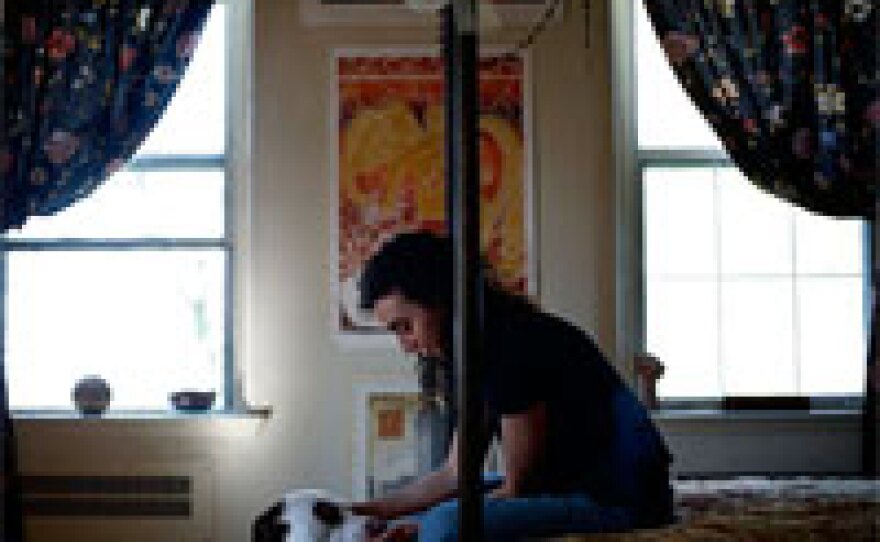
The emotional and intellectual challenges of college can knock students off balance. One group is especially at risk: students with mental illnesses. The illnesses are isolating, and the students may be far from the support of their family.
Students with depression, bipolar disease or schizophrenia have to find their own way through. That's what 22-year-old college senior Juliana Kerrest has done, with the help of a group called Active Minds.
At the start of the fall semester at Johns Hopkins University, Kerrest was anchoring a corner booth, one of about 250 crowded onto the floor of the gym and filled with students trying to attract others to their clubs.
Kerrest, delicately pretty with a fine-boned face and wildly curly brown hair, was offering candy to get people to listen to her spiel. Her club, Active Minds, offers movies, scream fests, speakers and, occasionally, free pizza.
The point of the club is to inform students about mental illness and de-stigmatize it.
Calling out to students about her club was not something she would have predicted she would be doing the previous spring. Back then, she had had enough of the crushing depressive episodes that periodically floored her.
A Troubled History
She had hoarded antidepressants and painkillers over the years. But she couldn't just take them — there was her pit bull, Caramel, to worry about.
So Kerrest devised a plan. She'd check into the hotel next door, where they'd be sure to find her when they came to clean the room, and they'd see her note asking someone to feed and walk the dog.
She checked the hotel's reservation information on the Web.
Her actions were the result of a long struggle.
"I started self-injuring when I was 13. Cutting, initially, and hitting, and I tried burning and things like that," Kerrest says.
She was in and out of talk therapy, on and off meds. Sometimes they helped. Sometimes they didn't. "I got very depressed," she says. "There were a lot of thoughts of suicide. I wouldn't feel like hanging out with my friends. I wouldn't feel like doing anything."
Stressful Transition
Kerrest managed to graduate from high school and get into Johns Hopkins. But the depressive episodes continued.
"It's like suffocation, kind of, and it's this very vivid drowning," she says. "But it's like slow — and you just want to stop it and take a deep breath, but everything is very thick and heavy, and your brain doesn't seem to be working right."
One of the worst parts about it was the loneliness. "To be so alone in such a darkness is horrible," she says.
At first, her friends would come by and knock on her dorm-room door to see if she wanted to go out.
"And I wouldn't answer, and I would just be lying there in the dark. But knowing they would come and knock on the door just made me feel a little better," she says.
But not better enough. In November of her freshman year, on the advice of her therapist, she took a medical leave.
Not The Only One
And Kerrest got to thinking — she couldn't be the only student suffering from a mental illness.
College mental health expert Richard Kadison of Harvard University says she's right. The stress of the transition to college can bring out depression and other problems. In addition, he says, "more people with diagnoses are going to college because they get treated earlier, and with treatment people are able to get to college, students who never would have been able to get to college in the past."
When she came back to school, she talked to school counselor Clare King, who told her about Active Minds. It was a club where students with mental illness could feel comfortable, and where they and other students could learn more about mental illness.
Kerrest and a friend started a chapter at Hopkins in the spring of 2006. The group kept her busy, but the depression came back. That's what had her planning her suicide and checking the availability of rooms at the hotel next door.
What undid her plan was concern about who would take care of her dog. That started her strategizing, and that slowed her down enough to recognize what she was doing and ask for help. She called King, who talked her out of it.
What's held her together is her quiet determination, the knowledge she's gained over the years about her own illness, and being involved with Active Minds.
"It's using this very big negative in my life and turning into something positive," Kerrest says. "Instead of thinking about mental illness because I just cut myself or I'm suicidal, I'm thinking about how many freshmen are out there."
Some of them may be like she was, needing to know there are others out there like them. Some of them may just have friends with problems and want to help.
Today, the loneliness isn't as bad as it once was, Kerrest says. And when she graduates this coming May, she hopes the leadership and organizational skills she's picked up will help her get a job with an international human rights group.
Radio story produced by Rebecca Davis.
Copyright 2022 NPR. To see more, visit https://www.npr.org. 9(MDAzMjM2NDYzMDEyMzc1Njk5NjAxNzY3OQ001))







